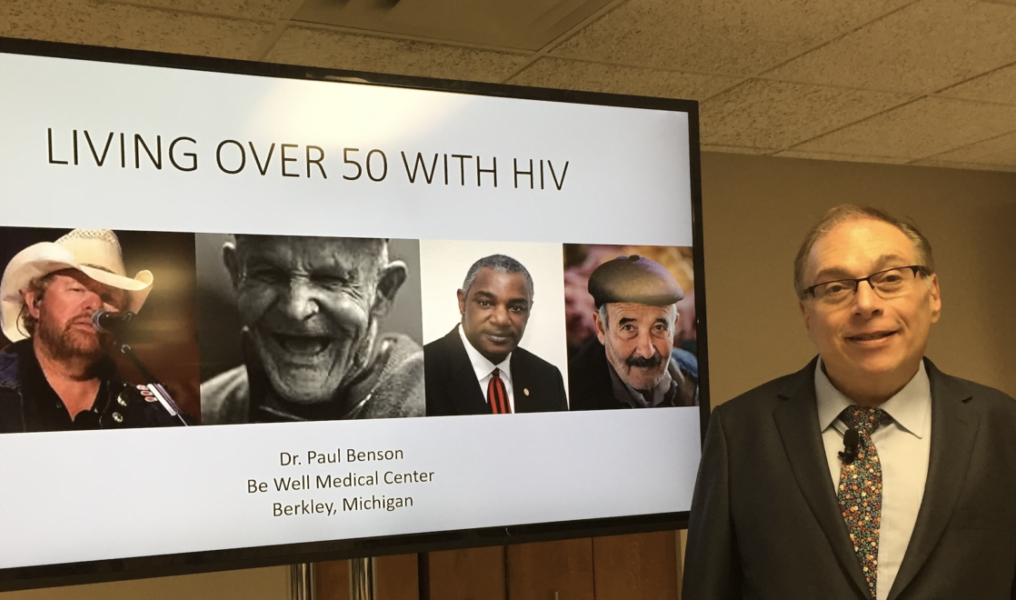MADISON HEIGHTS – It would have been an impossible dream 30 years ago, to live with HIV for decades and to actually grow into old age with the virus. Yet with the medical advances and reduced toxicity of the medications that suppress HIV, those who are aging with the virus now face a new set of challenges.
Living with HIV Over 50 was the title of an April 30 lecture presented by Dr. Paul Benson, a longtime specialist in the treatment of HIV/AIDS and the social movement to de-stigmatize HIV and the people infected with it.
"Times have changed and most of you in this room are old enough to remember that lots of people with HIV would have a hard time surviving from one year to the next. Birthdays and holidays were celebrated thinking that this may be the last," Benson said. "But now, with all the advances in medicine and technology people with HIV are living longer and we find they are subject to additional health concerns that are not HIV itself."
Benson explained that inflammation from other diseases is higher in people with HIV, and it is that inflammation that causes more health problems than the HIV virus itself in older people.
"HIV is not your biggest problem. We can control the HIV with drugs. Comorbidity is the issue," he said. "We need to use aggressive treatment of anything so as to not allow inflammation to get out of control."
Because inflammation, among other factors, can quicken how a body ages.
"People with HIV tend to have chronic inflammation more than people without HIV. And that inflammation causes our bodies to get older quicker," Benson said. "And so what we need to do medically is to be very vigilant and very aggressive in treating little disorders early."
By using an app on people's phones, Benson was able to poll the group of about 50 people with questions related to their status and health. Everyone there said they were over 50, and a large majority reported having HIV over 11 years — 41 percent said they were HIV-positive for over 20 years, and 29 percent between 11 and 20 years. Remarkably, 100 percent reported that they have an undetectable viral load. But over 80 percent of respondents said they are currently being treated for hypertension, depression, low testosterone, cancer, liver disease or high cholesterol.
Benson said many doctors will wait to treat patients who have borderline high sugar levels or who have slightly higher cholesterol numbers and instead encourage their patients to try and reduce these risk factors with changes in lifestyle and eating habits.
"In the HIV realm of primary care, we can't allow a little bit of anything. We need to be aggressive and treat all these comorbidities because at the end of the day that results in lower inflammation, which results in us living longer and healthier," Benson said.
During a lively Q&A session, people asked questions about viral load measurements, future protocols, how to be more aware of their health, diet and alcohol consumption and more. Benson described some changes he is making in his practice to better serve his clients aging with HIV including more testing to find diseases earlier and treating those diseases as soon as they appear. The practice is starting Group Medical Appointments, one-hour meetings with Benson and/or other staff members and eight to 10 HIV positive patients to have a deep discussion on issues affecting their health, and allow patients to learn from each other.
He also empowered the group to become spokespeople for the use of PrEP, or Pre-exposure prophylaxis, drugs that can prevent HIV infection.
"You can be the ambassadors. You have the experience with HIV/AIDS. Encourage people to avoid infection by using PrEP," Benson said.
Aging With HIV Requires Vigilance and Hope










